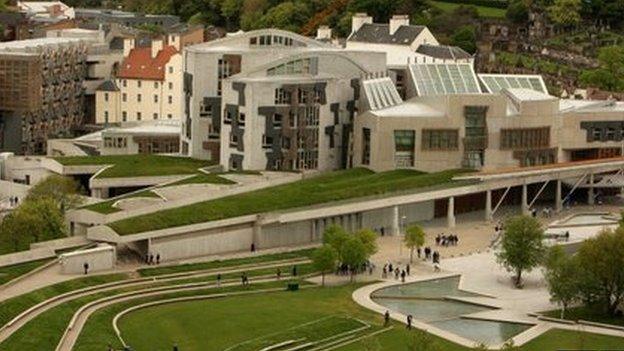Councils call for devolved powers
- Published

Councils said power should not just be devolved to Holyrood
Councils are calling for an urgent meeting with the Westminster government to make the case for devolving more power to local communities.
Scottish local government body Cosla - and its counterparts in the rest of the UK - have written to Cabinet Committee chairman William Hague.
They argue councils and communities across the UK need far more powers.
Cosla said the debate should not simply be about what powers to transfer from Westminster to Holyrood.
It has said the debate should also look at whether some current Westminster powers - for instance on the delivery of some benefits - could go straight to local government.
Strengthen the powers
Cosla president David O'Neill argues there should be a debate about "subsidiarity" - whether a power is most appropriately held at a local, Scottish or UK level.
Local government in Scotland is Holyrood's responsibility. Most powers which affect day-to-day life lie with either Holyrood or local authorities so there would be limited opportunities for Westminster to strengthen the powers of Scottish local government directly.
However moves to give Holyrood more powers - especially over finance - could potentially give the Scottish government more flexibility over local government.
A copy of the letter is also being sent to the Smith Commission which is trying to reach an agreement between the Scottish political parties on how to extend devolution. It hopes to report by 30 November.
The council organisations for the four nations of the UK say they want to thrash out a deal on devolution to communities in the United Kingdom.
Public trust
They say they have thrown down the gauntlet to Westminster to "take a bold step towards a new system of government" which would move "power to the local level" across all four nations.
The letter argues that the referendum on independence for Scotland has "shown that public trust in the old ways of central control has been shattered beyond repair" and "too many decisions that affect local communities are centralised in Westminster, Holyrood, Cardiff Bay and Stormont".
This "expensive, centralised approach" leads to governments trying to "'second guess what is best for localities," it says.
Local government leaders stress that the UK government's Cabinet Committee examining devolved powers has a "'unique opportunity to refresh local democracy and empower local communities right across our nation".
They warn that the debate about devolving powers to national parliaments "skews the discussion" and misses the core issue that "national parties and local communities in every part of our nation have signalled a desire for a revival of our local democratic systems".
As the elected voice of communities across England, Northern Ireland, Scotland and Wales, they are now urgently calling for a meeting with government "to discuss a revival of local democracy in the United Kingdom" that would see "real momentum behind the devolution of powers" beyond national parliaments.
Key principles
"Any new settlement which ignores the re-awaking of local identity in the UK is likely to be unsustainable," they say.
The letter calls on government to urgently address three key principles in the devolution debate by:
Establishing a principle of subsidiarity, which would ensure that power is transferred to the level of government closest to the people.
Securing and enhancing the legal position of local government. This would mean a defined set of powers and responsibilities which set out what local government can support at the local level so that public services can be designed around local need.
Providing greater fiscal autonomy for local government. The current centralised system of public finance is inefficient and stymies economic growth. Greater responsibility for funding at a local level would improve public services and ensure that local residents and business see how their money is used.
The letter is signed by Cllr David sparks, chair of the Local Government Association, Cllr David O'Neill, President of Convention Of Scottish Local Authorities, Cllr Bob Wellington, Leader of Welsh Local Government Association, Cllr Dermot Curran, president of the Northern Ireland Local Government Association.
In the summer, a commission established by Cosla on strengthening local democracy in Scotland produced a report outlining ways forward.
It argued councils should be responsible for raising a greater proportion of their budgets and less reliant on the money they receive from the Scottish government.
The report argued there had been a 50-year trend towards centralisation in Scotland which had taken power out of the hands of local communities.